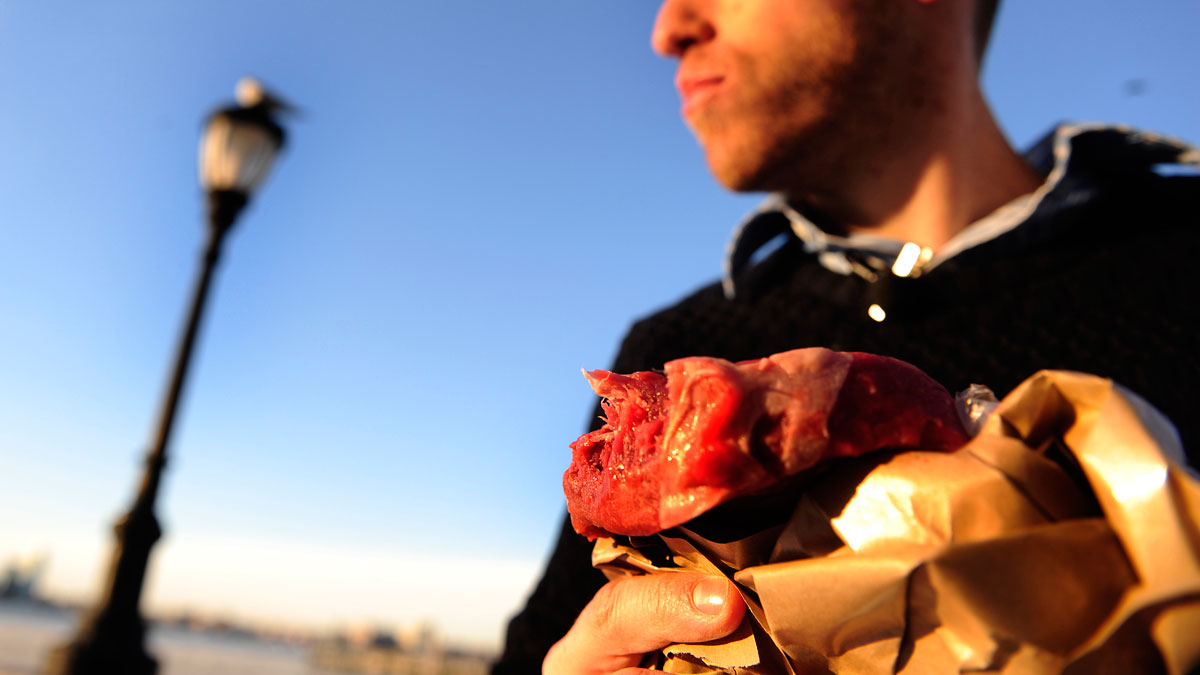The Paleo diet: does the Palaeolithic method really work?
The paleo diet may help you lose weight, but dietitians describe it as 'a dangerous fad'

A free daily email with the biggest news stories of the day – and the best features from TheWeek.com
You are now subscribed
Your newsletter sign-up was successful
By Emma Young
Those who follow the Palaeolithic diet hold the good old days in unusually high esteem. Their fondness for a slab of meat over a piece of toast, bone broth over milk, and nuts over a bag of crisps is well known. This is because the paleo diet advises a return to pre-agrarian eating habits in a twenty-first century environment. So is it healthy to eat like it is 2152BC?
What is the theory behind the Paleo diet?
The Week
Escape your echo chamber. Get the facts behind the news, plus analysis from multiple perspectives.

Sign up for The Week's Free Newsletters
From our morning news briefing to a weekly Good News Newsletter, get the best of The Week delivered directly to your inbox.
From our morning news briefing to a weekly Good News Newsletter, get the best of The Week delivered directly to your inbox.
The theory behind the paleo diet is that while our lifestyle has changed dramatically, human bodies have stayed very much the same.
Proponents of the diet claim that our unchanged genetic makeup suits the diet to which we adapted during pre-agricultural days. From their perspective, the diseases, cavities and obesity that have taken hold since we stopped hunting and gathering and started farming are a result of this mismatch.
So what do scientists think?
Many scientists have disputed the guiding principle behind the paleo diet. According to the evolutionary biologist Marlene Zuk, it's incorrect to say that our genes haven't adapted in some significant ways. She points to lactase persistence – the ability to digest milk as adults that has developed in some populations – as evidence of human development since the Stone Age. The nostalgic concept of an 'evolutionarily correct' diet, Zuk contends, is flawed.
A free daily email with the biggest news stories of the day – and the best features from TheWeek.com
Are there any problems with adopting the paleo diet?
The main difficulties with Paleo relate to its practicality. In the modern world it is simply impossible to get all the same ingredients our Stone Age ancestors were consuming.
Meat is a very different thing now than it was then, as are fruits and vegetables. As John Durant's The Paleo Manifesto points out, a diet that's truly representative of Palaeolithic options might include human flesh, a clear no-no in today's world. Also, Durant notes, completely avoiding dairy and grains could well cut out essential nutrients.
There's also the Paleo position on carbohydrates to consider. According to the diet, carbohydrates are largely unwelcome. Why? Because, paleo enthusiasts say, our ancient forebears didn't eat them at all. A recent study by scientists at University College London is the latest effort to challenge this assumption. According to evolutionary geneticist Dr Mark Thomas, fresh analysis of the DNA of hunter-gatherers has indicated that wild tubers and other starchy plants were most certainly used in Stone Age cooking.
So does the paleo diet work?
As with any eating protocol, the Palaeolithic diet is defined by the good it claims to do. Many of its proponents say that as well as keeping you healthy, the diet can also help you lose weight.
Nutritionist Petronella Ravenshear says that shedding pounds on the Paleo diet is not uncommon.
"The first thing you usually see is weight loss," Ravenshear told the Daily Telegraph. "Because it contains enough protein and fat from meat, nuts and seeds, a paleo diet also balances out insulin levels. This generally means they are less hungry between meals because the protein sustains them longer than carbohydrate. They're not getting blood-sugar crashes a couple of hours after eating. Their calorie intake consequently goes down naturally."
So scientists say this claim may be true for some people.
As regards further claims that the diet can cure everything from autoimmune diseases to diabetes and from depression to autism, the evidence is less than clear.
However, in its frank assessment of whether of not people should adopt the paleo diet, the British Dietetic Association (BDA) is incredibly clear.
"The paleo diet trend is a dangerous fad," says Lucy Jones, a spokeswoman for the BDA. "There isn't any proof that it improves health, and its demand that you exclude food groups essential to health such as dairy, grains and legumes could leave people seriously deficient in essential vitamins and calcium, not to mention constipated from the lack of dietary fibre."
-
 The EU’s war on fast fashion
The EU’s war on fast fashionIn the Spotlight Bloc launches investigation into Shein over sale of weapons and ‘childlike’ sex dolls, alongside efforts to tax e-commerce giants and combat textile waste
-
 How to Get to Heaven from Belfast: a ‘highly entertaining ride’
How to Get to Heaven from Belfast: a ‘highly entertaining ride’The Week Recommends Mystery-comedy from the creator of Derry Girls should be ‘your new binge-watch’
-
 The 8 best TV shows of the 1960s
The 8 best TV shows of the 1960sThe standout shows of this decade take viewers from outer space to the Wild West